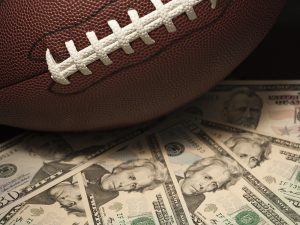SCOTUS Punts On Amateurism In College Sports, But It May Not Be The End
Lots of briefs filed, not many changes.
 Unsurprisingly — after all, they accept only about one percent of cert petitions, and they’ve been even stingier this Term — the Supreme Court has opted to pass on review of the Ninth Circuit’s decision in the O’Bannon v. NCAA case. That has left the state of college amateur student-athletes in a bit of a pickle.
Unsurprisingly — after all, they accept only about one percent of cert petitions, and they’ve been even stingier this Term — the Supreme Court has opted to pass on review of the Ninth Circuit’s decision in the O’Bannon v. NCAA case. That has left the state of college amateur student-athletes in a bit of a pickle.
You see, that decision held that the NCAA’s rule which prohibited student athletes from getting paid for the use of their names, images, and likenesses was an unlawful restraint of trade in violation of the Sherman Antitrust Act. Which might sound like a victory for athletes getting a fat payday for their talents, but the actual procedure is a bit more murky. Despite the strong (for plaintiffs) statement about the NCAA’s antitrust power, the appellate decision also allowed colleges to remedy the antitrust harm by offering the full cost of attendance. So… lots of briefs filed, not many changes.
But despite the weird stasis codified by the Ninth Circuit, there may yet be change on the horizon in the form of Jenkins v. NCAA, which is in front of the same district judge as the O’Bannon case was.

Legal AI: 3 Steps Law Firms Should Take Now
Law professor Michael McCann, writing in Sports Illustrated, explains the legal argument this next case hopes to make:
The legal argument brought by the Jenkins’ plaintiffs is straightforward. They contend that the NCAA and its member schools, conferences and affiliated organizations have unlawfully conspired to cap the value of athletic scholarships to tuition, room, board, books and fees. Their proposed remedy would be that colleges—which already compete for star high school athletes—compete in ways that financially benefit the players.
….
To be clear, under the Jenkins model, colleges would not be required to pay star athletes more than what the colleges already provide through athletic scholarships. Colleges, however, could no longer “conspire” with one another on a system where no school pays student-athletes in excess of athletic scholarships. Attorneys for Jenkins stress that while most colleges claim to lose money on their athletics programs, it seems money is being made given the multi-million dollar salaries paid to coaches, as well as the construction of large new stadia and sophisticated training facilities.
This could well upend everything we know about the way that college sports work.
NCAA Defeated By ‘Rule of Reason’ In O’Bannon Lawsuit [ATL Redline]
In denying O’Bannon case, Supreme Court leaves future of amateurism in limbo [Sports Illustrated]
Sponsored

Is The Future Of Law Distributed? Lessons From The Tech Adoption Curve

Navigating Financial Success by Avoiding Common Pitfalls and Maximizing Firm Performance

Legal AI: 3 Steps Law Firms Should Take Now

Early Adopters Of Legal AI Gaining Competitive Edge In Marketplace
Kathryn Rubino is an editor at Above the Law. Feel free to email her with any tips, questions, or comments and follow her on Twitter (@Kathryn1).
Sponsored

Early Adopters Of Legal AI Gaining Competitive Edge In Marketplace








